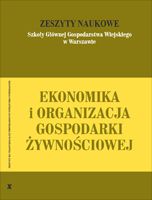Main Article Content
Article Details
AFSCA, 2013: Circulaire relative aux dispositions applicables aux banquesalimentaires et associations caritatives. Agence fédérale pour la sécurité de la chaîne alimentaire, Ref. PCCB/S3/1092228, date 02/08/2013, Bruxelles, Belgique,http://www.afsca.be/denreesalimentaires/circulaires/_documents/2013_08_02_BAetAC_FR.pdf, dostęp: 15.12.2015.
BAGHERZADEH M., INAMURA M., JEONG H., 2014: Food Waste Along the Food Chain. OECD Food, Agriculture and Fisheries Papers, 71, OECD Publishing.
DĄBROWSKA A., JANOŚ-KRESŁO M., 2013: Marnowanie żywności jako problem społeczny. Handel Wewnętrzny, 4 (345), s. 14-25.
DĄBROWSKA A., OZIMEK I., 2014: Bezpieczeństwo żywnościowe konsumentów w Polsce - wybrane aspekty. Handel Wewnętrzny 4 (351), s. 55-69.
European Commission DG ENV - Directorate C, 2011: Preparatory study on food waste across EU 27. October 2010. Technical Report - 2010 - 054. European Communities, Brussels. Prepared by Project Team: Bio Intelligence Service, Umweltbundesamt, AEA.
European Commission, 2012: Europeans' Attitudes Towards Food Security, Food Quality and the Countryside. Report. Special Eurobarometer 389, http://ec.europa.eu/public_ opinion/archives/ebs/ebs_389_en.pdf, dostęp: 14.11.2015).
European Commission, 2015: Flash Eurobarometer 425 - September 2015 "Food waste and date marking" Report, European Union, Brussels.
FAO, 2011: Global food losses and food waste. Extent, causes and prevention. FAO, Rome.
FAO, 2013: Food wastage footprint. Impact on natural resources. Summary Report. FAO, Rome.
FAO, IFAD, WFP, 2014: The State of Food Insecurity in the World. Strengthening the enabling environment for food security and nutrition. FAO, Rome.
FoodDrinkEurope, 2014: Preventing food wastage in the food and drink sector. Europe's food and drink manufacturers take action to prevent food wastage, FoodDrinkEurope, Brussels.
FPBŻ, 2012: Raport Federacji Polskich Banków Żywności. Marnowanie żywności w Polsce i Europie. FPBŻ, Warszawa.
FPBŻ, 2013: Raport Federacji Polskich Banków Żywności. Zapobieganie marnowaniu żywności z korzyścią dla społeczeństwa. FPBŻ, Warszawa.
FPBŻ, 2015: Raport Federacji Polskich Banków Żywności. Nie marnuj jedzenia. FPBŻ, Warszawa.
MARKAKIS L., 2014: Food labels, consumers blamed for waste. Euranet Plus News Agency. http://euranetplus-inside.eu/food-labels-and-consumers-blamed-for-waste/ dostęp: 01.11.2015.
ONZ, 2015: Sustainable Development Goals. https://sustainabledevelopment.un.org/topics, dostęp: 01.11.2015.
PARIZEAU K., MASSOW M., MARTIN R., 2015: Household-level dynamics of food waste production and related beliefs, attitudes, and behaviours in Guelph, Ontario. Waste Management 35, s. 207-217.
REJMAN K., WROŃSKA J., 2014: Marnotrawstwo żywności w gospodarstwach domowych w kontekście rozwoju sfery konsumpcji. [w:] N. Drejerska (red.): Rolnictwo, gospodarka żywnościowa, obszary wiejskie - 10 lat w Unii Europejskiej. Wydawnictwo SGGW, s. 97-110.
Van BOXSTAEL S., DEVLIEGHERE F., BERKVENS D., VERMEULEN A., & UYTTENDAELE M., 2014: Understanding and attitude regarding the shelf life labels and dates on prepacked food products by Belgian consumers. Food Control 37 (0), 85-92.
WRAP, 2010: Final report—Waste arising in the supply of food and drink to households in the UK. WRAP, Banbury.
WRAP, 2011: New estimates for household food and drink waste in the UK. WRAP, Banbury.
Downloads
- Michał Gazdecki, Hierarchy of company relation factors in the distribution channels of crop protection products , Zeszyty Naukowe SGGW - Ekonomika i Organizacja Gospodarki Żywnościowej: No. 113 (2016)
You may also start an advanced similarity search for this article.
- Barbara Kowrygo, Krystyna Rejman, Ewa Świstak, Evaluation of Food Consumption in Poland in the New Socio-Economic Conditions , Zeszyty Naukowe SGGW - Ekonomika i Organizacja Gospodarki Żywnościowej: No. 29 (1997)
- Krystyna Rejman, Monika Świątkowska, Ewa Świstak, Proposals for nutrition models for the urban and rural population in Poland in the year 2005 , Zeszyty Naukowe SGGW - Ekonomika i Organizacja Gospodarki Żywnościowej: No. 32 (1998)
- Krystyna Rejman, Ewa Halicka, Barbara Kowrygo, Applying the Institutional Economics in Solving Hold-up Problems on the Sample of Selected Sectors of Agri-food Economy , Zeszyty Naukowe SGGW - Ekonomika i Organizacja Gospodarki Żywnościowej: No. 45 (2001)
- Krystyna Rejman, Hanna Górska-Warsewicz, Development of Catering Sector in Poland in the Nineties , Zeszyty Naukowe SGGW - Ekonomika i Organizacja Gospodarki Żywnościowej: No. 47 (2002)





